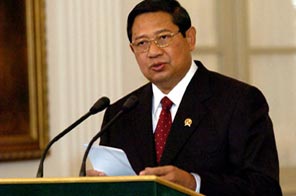Yudhoyono sworn in for second term
JAKARTA: Liberal ex-general Susilo Bambang Yudhoyono was sworn in as Indonesia's president on Tuesday after winning a second five-year term with promises of economic growth and political reform.
The softly-spoken leader swore on the Koran, Islam's holy book, to uphold the constitution during a ceremony in the national assembly in Jakarta which was broadcast around the archipelago of 234 million people.
"By Allah I swear I will adhere to the constitution as faithfully as possible, and will commit myself to the country and the people," Yudhoyono said.
A massive security blanket descended on the centre of the capital, with about 20,000 police backed by armoured vehicles on hand to secure the inauguration.
The event was attended by the leaders of Australia, Brunei, East Timor, Malaysia and Singapore, as well as senior officials from around the world.
Yudhoyono, 60, trounced former president Megawati Sukarnoputri in 2004 to become the mainly Muslim country's first directly elected head of state since the fall of late military strongman Suharto in 1998.
He did it again in July, easily defeating Democratic Party of Struggle (PDI-P) chief Megawati as well as his vice president, the Golkar Party's Jusuf Kalla, to become the first Indonesian leader to be democratically re-elected.
Cementing his place as the figurehead of the post-Suharto reform era, Yudhoyono's centrist Democratic Party won the most seats in parliament in April general elections just eight years after it was founded.
He has promised to crack down on corruption, boost infrastructure spending to unlock economic potential and advance bureaucratic reform.
The doctor of agricultural studies -- who likes to pen romantic ballads in his spare time -- has also pledged to steer Southeast Asia's biggest economy through the global downturn.
The government has predicted economic growth of 4.0-4.5 percent this year, third only to China and India in the G20 club of rich and developing countries. The economy grew 6.1 percent in 2008.
Strong domestic demand as well as relatively low dependency on exports have insulated Indonesia from the global crisis, and the local stock market has soared almost 80 percent this year.
But about half the population continues to live on less than two dollars a day, according to the Asian Development Bank.
All eyes now turn to the announcement of the new cabinet on Wednesday, after months of behind-the-scenes political horse-trading which has become the hallmark of Indonesian democracy.
The new executive is expected to be a broad coalition government of secular and Islamic parties, combining trusted technocrats in key economic seats with party-political appointees.
Economists have already applauded Yudhoyono's decision to replace Kalla with US-educated economist and former central bank chief Boediono as vice president.
The markets are also hoping to see Finance Minister Sri Mulyani Indrawati and Trade Minister Mari Pangetsu -- considered two of Asia's most powerful women -- keep their hands on the economic levers in the new cabinet.
But with 34 seats to fill, there is plenty of room for Yudhoyono -- who cannot be elected to a third term -- to offer places to political appointees to shore up party loyalties, analysts said.
"The old adage 'power corrupts, absolutely' sounds a warning bell to be heeded," The Jakarta Post daily warned in an editorial Tuesday.
Such appointees will include allies of outgoing Welfare Minister and business tycoon Aburizal Bakrie, one of the chief financial backers of Yudhoyono's 2004 election campaign and the newly appointed chief of Golkar.
Bakrie is one of Indonesia's richest men with a family empire spanning interests from coal to property, but he dismisses any suggestion of conflicts of interest.
Other partners in the incoming government are expected to include the secular National Awakening Party and the Prosperous Justice Party, which backs the introduction of sharia or Islamic law.
The PDI-P is likely to remain the main force in an otherwise feeble opposition.






